12 start with G start with G

Officials mingled in the lobby of the Oktyabrskaia Hotel--shaking hands, sipping champagne, signing their names--and Germany was united. In this undramatic fashion, the international community closed the book on the drama of divided Germany. But nothing so momentous could be quite so quiet and uncomplicated, as this volume makes strikingly clear. This is the first book to go behind the scenes through access to still not opened archives in many countries. Germany Unified and Europe Transformed discloses the moves and maneuvers that ended the Cold War division of Europe.
Philip Zelikow and Condoleezza Rice, who served in the White House during these years, have combed a vast number of documents and other sources in German and Russian as well as English. They also interviewed the major actors in the drama--George Bush, Hans-Dietrich Genscher, Eduard Shevardnadze, James Baker, Anatoly Chernyayev, Brent Scowcroft, Horst Teltschik, and many others. Their firsthand accounts merge to create a complete, detailed, and powerfully immediate picture of what happened. The book takes us into Gorbachev's world, illuminating why the Soviet leader set such cataclysmic forces in motion in the late 1980s and how these forces outstripped his plans. We follow the tense debates between Soviet and East German officials over whether to crush the first wave of German protesters--and learn that the opening of the Berlin Wall was in fact one of the greatest bureaucratic blunders in human history. The narrative then reveals the battle for the future of East Germany as it took shape between West German Chancellor Helmut Kohl and the reform Communist leader, Hans Modrow--East Germany's "little Gorbachev." Zelikow and Rice show how Kohl and George Bush held off the reactions of governments throughout Europe so that Kohl could awaken East Germans to the possibility of reunification on his terms. Then the battle over the future of the NATO alliance began in earnest.
The drama that would change the face of Europe took place largely backstage, and this book lets us in on the strategies and negotiations, the nerve-racking risks, last-minute decisions, and deep deliberations that brought it off. It is the most authoritative depiction of contemporary statecraft to appear in decades.

Officials mingled in the lobby of the Oktyabrskaia Hotel--shaking hands, sipping champagne, signing their names--and Germany was united. In this undramatic fashion, the international community closed the book on the drama of divided Germany. But nothing so momentous could be quite so quiet and uncomplicated, as this volume makes strikingly clear. This is the first book to go behind the scenes through access to still not opened archives in many countries. Germany Unified and Europe Transformed discloses the moves and maneuvers that ended the Cold War division of Europe.
Philip Zelikow and Condoleezza Rice, who served in the White House during these years, have combed a vast number of documents and other sources in German and Russian as well as English. They also interviewed the major actors in the drama--George Bush, Hans-Dietrich Genscher, Eduard Shevardnadze, James Baker, Anatoly Chernyayev, Brent Scowcroft, Horst Teltschik, and many others. Their firsthand accounts merge to create a complete, detailed, and powerfully immediate picture of what happened. The book takes us into Gorbachev's world, illuminating why the Soviet leader set such cataclysmic forces in motion in the late 1980s and how these forces outstripped his plans. We follow the tense debates between Soviet and East German officials over whether to crush the first wave of German protesters--and learn that the opening of the Berlin Wall was in fact one of the greatest bureaucratic blunders in human history. The narrative then reveals the battle for the future of East Germany as it took shape between West German Chancellor Helmut Kohl and the reform Communist leader, Hans Modrow--East Germany's "little Gorbachev." Zelikow and Rice show how Kohl and George Bush held off the reactions of governments throughout Europe so that Kohl could awaken East Germans to the possibility of reunification on his terms. Then the battle over the future of the NATO alliance began in earnest.
The drama that would change the face of Europe took place largely backstage, and this book lets us in on the strategies and negotiations, the nerve-racking risks, last-minute decisions, and deep deliberations that brought it off. It is the most authoritative depiction of contemporary statecraft to appear in decades.
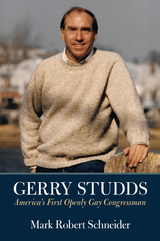
The defining moment of his career, however, came in 1983, when he was censured by the House for having had an affair with a page ten years previously. On the floor of Congress, Studds confessed to having behaved inappropriately and then courageously declared that he was a gay man—becoming the country's first openly gay member of Congress. Defying all expectations, Studds won reelection in a bruising campaign. For the rest of his career, he remained loyal to his constituents' concerns while also championing AIDS research and care, leading the effort in Congress to allow gays and lesbians to serve in the military, and opposing the Defense of Marriage Act. Once a deeply conflicted man, he ultimately found a balance between his public service and his private life, which included a happy, legally recognized marriage.
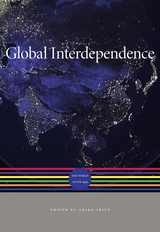
Global Interdependence provides a new account of world history from the end of World War II to the present, an era when transnational communities began to challenge the long domination of the nation-state. In this single-volume survey, leading scholars elucidate the political, economic, cultural, and environmental forces that have shaped the planet in the past sixty years.
Offering fresh insight into international politics since 1945, Wilfried Loth examines how miscalculations by both the United States and Soviet Union brought about a Cold War conflict that was not necessarily inevitable. Thomas Zeiler explains how American free-market principles spurred the creation of an entirely new economic order—a global system in which goods and money flowed across national borders at an unprecedented rate, fueling growth for some nations while also creating inequalities in large parts of the Middle East, Latin America, and Africa. From an environmental viewpoint, John McNeill and Peter Engelke contend that humanity has entered a new epoch, the Anthropocene era, in which massive industrialization and population growth have become the most powerful influences upon global ecology. Petra Goedde analyzes how globalization has impacted indigenous cultures and questions the extent to which a generic culture has erased distinctiveness and authenticity. She shows how, paradoxically, the more cultures blended, the more diversified they became as well.
Combining these different perspectives, volume editor Akira Iriye presents a model of transnational historiography in which individuals and groups enter history not primarily as citizens of a country but as migrants, tourists, artists, and missionaries—actors who create networks that transcend traditional geopolitical boundaries.
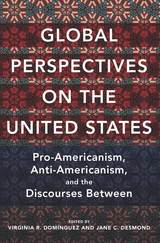

Tracing the liberal state structure back to the closing stages of the English Civil War and settlement in North America, it argues that the rise of the English-speaking West has created rivalries between contender states that are never entirely put to rest. With each round of Western expansion, new rivalries are created.
Offering a truly global analysis that covers every area of the world - from Europe and America to China, the Middle East, Latin America and Russia -- he analyses the development of international relations post WWII, and questions whether the neoliberal project and its human rights ideology have collapsed back into authoritarianism under the guise of the 'war on terror'.

Beginning with a discussion of the political, economic, and cultural development of Europe from a historical perspective, the focus of the book shifts to an examination of the changing forms of European democracy and the move from public ownership and planning to privatization and deregulated competition. Further essays analyze the challenge to national party systems and electoral performance from emerging social movements and organized interest groups. Political and bureaucratic structures are also examined as is the new European constitutionalism reflected in the increasingly significant role of the judiciary. Lastly, attention is turned to several major themes in European politics: the changing foundations of foreign and security policy, the function of industrial champion firms, and the retreat from the welfare state. Primarily comparative in its scope, Governing the New Europe does devote particular attention to specific major states as well as to the importance of the European Union to the political life of member and non-member countries.
Neither exaggerating the common features of the patterns that have emerged in contemporary Europe nor capitulating to the complexity of enduring differences and instabilities between states, Governing the New Europe will become one of the standard texts in its field.
Contributors. Jack Hayward, Jolyon Howorth, Herbert Kitschelt, Marie Lavigne, Tom Mackie, Michael Mezey, Edward C. Page, Richard Parry, Richard Rose, Anthony Smith, Alec Stone
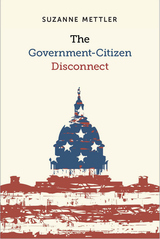
Drawing from original survey data which probed Americans’ experiences of 21 federal social policies -- such as food stamps, Social Security, Medicaid, and the home mortgage interest deduction -- Mettler shows that 96 percent of adults have received benefits from at least one of them, and that the average person has utilized five. Overall usage rates transcend social, economic, and political divisions, and most Americans report positive experiences of their policy experiences. However, the fact that they have benefited from these policies has little positive effect on people’s attitudes toward government. Mettler finds that shared identities and group affiliations, as well as ideological forces, are more powerful and consistent influences. In particular, those who oppose welfare tend to extrapolate their unfavorable views of it to government in general. Deep antipathy toward the government has emerged as the result of a conservative movement that has waged a war on social welfare policies for over forty years, even as economic inequality and benefit use have increased.
Mettler finds that voting patterns exacerbate the government-citizen disconnect, as those holding positive views of federal programs and supporting expanded benefits have lower rates of political participation than those holding more hostile views of the government. As a result, the loudest political voice belongs to those who have benefited from policies but who give government little credit for their economic well-being, seeing their success more as a matter of their own deservingness. This contributes to the election of politicians who advocate cutting federal social programs. According to Mettler, the government-citizen disconnect frays the bonds of representative government and democracy.
The Government-Citizen Disconnect illuminates a paradox that increasingly shapes American politics. Mettler's examination of hostility toward government at a time when most Americans will at some point rely on the social benefits it provides helps us better understand the roots of today's fractious political climate.
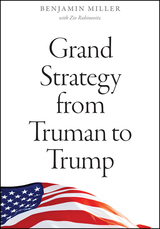
American foreign policy is the subject of extensive debate. Many look to domestic factors as the driving forces of bad policies. Benjamin Miller instead seeks to account for changes in US international strategy by developing a theory of grand strategy that captures the key security approaches available to US decision-makers in times of war and peace.
Grand Strategy from Truman to Trump makes a crucial contribution to our understanding of competing grand strategies that accounts for objectives and means of security policy. Miller puts forward a model that is widely applicable, based on empirical evidence from post-WWII to today, and shows that external factors—rather than internal concerns—are the most determinative.

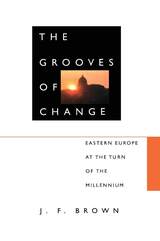
While acknowledging that the term “Eastern Europe” began to fall into disuse with the end of the cold war, Brown uses it as a framework for discussing the enduring features of the modern history of this region: its basic continuity, the prominence of ethnic and national factors, and its dependence on great powers or combinations of powers outside it. He explains the significance of the growing gulf between East Central Europe and South Eastern Europe, the overall political and economic deprivation and its effect on the people, the urgency of change, and the complex dynamics within Eastern Europe that have defied definitions and generalization. Finally, Brown points to the need for continuing assistance by the United States and the West and suggests what the twenty-first century may bring to this constantly changing part of the world.
Those seeking a clear overview of events in Eastern Europe during the recent psat and the state of these nations now will benefit from this incisive study by J. F. Brown.
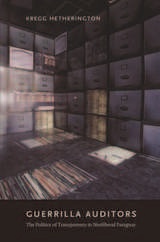
READERS
Browse our collection.
PUBLISHERS
See BiblioVault's publisher services.
STUDENT SERVICES
Files for college accessibility offices.
UChicago Accessibility Resources
home | accessibility | search | about | contact us
BiblioVault ® 2001 - 2024
The University of Chicago Press









